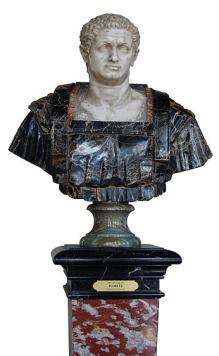
Pompey the Great was one of the most acclaimed generals and statesman of the Roman Empire. One can even claim that Pompey is the one who took the Roman Republic and transformed it into the mighty Roman Empire. He was nicknamed ”the great” because his intelligence was resembling to another famous historic statesman called ”Alexander the Great”.
Pompey was married Julia who was the daughter of Gaius Julius Caesar. He could rise easily and had great state connections thanks to being the son-in-law.
Fight Against the Cilician Pirates
”Teenage butcher” was another nickname of Pompey which was given by his enemies. He had hatred against pirates who started to become a menacing problem for the Rome’s supply lines. Pompey was given more than 700 ships, 200.000 infantry and horseman to deal with the pirates. Pompey had a forty day crusade along the Anatolian and Aegean coasts and cleared areas of the Aegean Sea, Roman Province of Bithynia and Pontus, Thrace, Marmara Sea, Black Sea, Lycia et Pamphylia Province of Roman Empire, Cyprus, and Cilicia out of pirates.
The Third Mithridatic War
The Third Mithridatic War taking place in Asia Minor might have been the most famous deed of Pompey the Great. Mithridates VI, the king of Pontus Kingdom had been a nuisance for the Romans. Pompey showed great strategic command skills against Mithridates and followed his armies around the Roman Province of Bithynia and Pontus, Roman Province of Cappadocia and Roman Armenia like a cat playing with mouse. The Third Mithridatic War and the final Mithridatic war was ended with complete Roman victory and annexation of many lands.
Annexation of Syria
Another victory of Pompey in Asia Minor was the annexation of Syria. The Roman armies of Pompey spent the winter in Antioch at the year 64. Pompey realized civil war torn Syria would be a problem for the Anatolian provinces of the Roman Empire, so he decided the complete annexation of Syria. This action resulted in the creation of The Roman Province of Syria.
Death of Pompey
When Caesar decided to make his epic cross of Rubicon River with his armies, the great Roman civil war began. Pompey was chosen by the senate to defeat the approaching Caesar who once was his ally and father-in-law. The final battle between Caesar and Pompey took place in Pharsalus, central Greece, on 9 August 48 BC and resulted with the victory of Caesar.
Pompey decided to flee to Egypt. He thought Egyptian king Ptolemy who was once his friend and ruler of his client kingdom of Egypt would protect him. Things didn’t go as Pompey thought since king Ptolemy was afraid of Caesar’s wrath and decided to assassinate Pompey the Great.